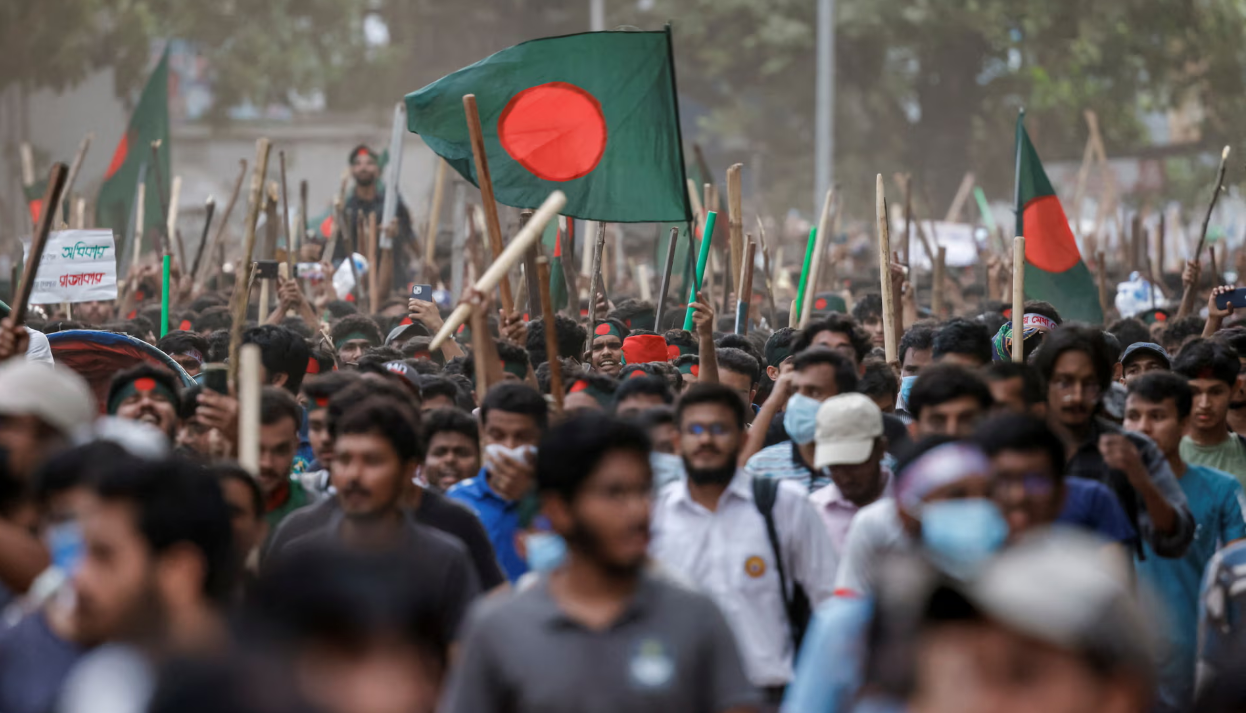
The recent student-led protests that culminated in the ousting of Awami League’s Hasina Wajid have garnered significant international attention, highlighting the Bangladeshi people’s unwavering resolve against years-long authoritarian regime. As Hasina sought refuge in India—her government’s key ally—her son, Sajeeb Wazed Joy, has made statements that seem more damaging than beneficial to both his party and his mother. His allegations of foreign interference, particularly blaming Pakistan’s Inter-Services Intelligence (ISI), deserve critical scrutiny. Such claims must be examined within the broader context of Bangladesh’s internal politics and its complex relationship with India.
Historical Context and Political Diversion
The Awami League, under Sheikh Hasina’s leadership, has maintained a tight grip on power in Bangladesh for over a decade. During this time, the party has often resorted to diversionary tactics, including externalizing blame to maintain its political capital. This has been a longstanding strategy, especially in times of domestic strife. By attributing unrest to external actors like Pakistan, the Awami League distracts the public from pressing issues such as economic challenges, governance failures, and human rights abuses.
This tactic serves multiple purposes: it unifies the populace against a common enemy, consolidates power by rallying nationalist sentiments, and deflects criticism of the government’s own actions. Such narratives have historically allowed the Awami League to justify crackdowns on dissent and to portray opposition parties, particularly the Bangladesh Nationalist Party (BNP) and Jamaat-e-Islami, as agents of chaos rather than legitimate political actors.
The Role of Misinformation
In the current scenario, the proliferation of misinformation through social media, as reported, seems to align with a coordinated effort to stoke anti-India sentiments while simultaneously vilifying Pakistan.
Suvrokamal Dutta’s assertion that the unrest is a product of Pakistan’s orchestration overlooks the broader socio-political context. It disregards the genuine grievances of the Bangladeshi people, who are increasingly disillusioned with the current regime’s failure to address their needs. By labeling dissent as foreign interference, the government undermines the legitimate aspirations of its citizens for democracy and justice.
The Quest for Sovereignty
Bangladesh’s sovereignty is a critical issue that has often been compromised under the guise of regional security partnerships, particularly with India. The allegations against Pakistan, while serving the former ruling party’s narrative, ignore the fundamental right of the Bangladeshi people to self-determination and governance free from external influence.
Bangladeshis have historically expressed their desire for a balanced foreign policy that prioritizes their nation’s interests over the geopolitical ambitions of larger powers. The narrative that positions Pakistan as the antagonist distracts from the pressing need for Bangladesh to reclaim its agency and foster an independent foreign policy that is not solely dictated by India or any other nation.
Pakistan’s Stance: A Call for Cooperation
It is essential to note that Pakistan has consistently extended a hand of friendship to Bangladesh, despite the historical grievances stemming from the Liberation War of 1971. The new political landscape in Bangladesh presents an opportunity for reevaluation and reconciliation.
Pakistan does not seek to undermine Bangladesh’s progress or stability. On the contrary, it wishes to engage in bilateral relations that prioritize mutual respect and cooperation. The false narratives being spun by the Awami League and its allies do not represent the realities of Pakistan’s intentions; instead, they are a means of deflecting criticism from the Bangladeshi government.
As the Bangladeshi people begin to recognize the fallacies in these diversionary tactics, it becomes imperative that they remain steadfast in their pursuit of democracy, development, and dignity. The future of Bangladesh should be shaped by its citizens, free from the shackles of manipulation by those in power who prefer to blame external forces rather than confront their shortcomings.
The Importance of a Unified Bangladesh
For Bangladesh to move forward, it is crucial to foster unity among its diverse political factions, including the Awami League and the BNP. The emphasis should be on creating a level playing field where all voices are heard and respected. Such inclusivity will not only strengthen the democratic fabric of the nation but also shield it from the divisive tactics employed by external forces, including misinformation campaigns.
As Joy himself stated, the restoration of democracy is essential for Bangladesh’s future. However, this must occur without the backdrop of fearmongering and the scapegoating of foreign entities. The Bangladeshi people are resilient and capable of charting their own path, one that prioritizes national interests over those of any external power.
A Future of Cooperation
In conclusion, while the unrest in Bangladesh is real and concerning, the narrative that positions Pakistan as the orchestrator of chaos is a simplification that ignores the complex realities on the ground. The Awami League’s attempts to shift blame serve only to obscure the underlying issues that require urgent attention.
Pakistan’s stance remains one of support and goodwill towards the people of Bangladesh. In this era of evolving political dynamics, it is crucial to foster a relationship built on mutual respect and understanding, rather than one marred by historical grievances and unfounded accusations. The future of Bangladesh should be determined by its people, and any attempt to divert from this path will only serve to delay the progress they rightfully seek.



















Leave a Reply